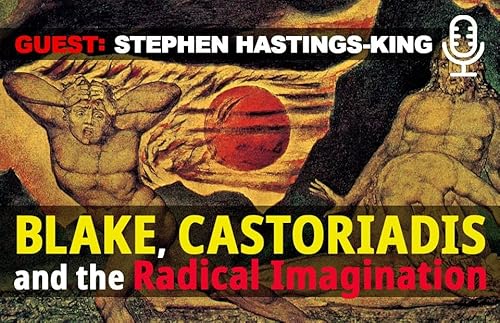Andy and Conor discussed how the focus of their attention has shifted in recent years from environmental crisis to the rise of fascism and illiberalism, particularly in the context of the Trump phenomenon. They also revisited the importance of William Blake for the blog, with Andy confirming that his appreciation for Blake has not changed.
A Blake-Inspired Spiritual Journey
Andy discussed his journey with William Blake, starting with his accidental discovery of Blake's work and his subsequent attraction to Blake. Andy shared how Blake's ideas influenced his understanding of the human imagination and its role in shaping our perception of reality. He also mentioned his relationship with Timothy Morton, who shares a similar perspective on Blake and the importance of the imagination. Andy's journey with Blake has led him to embrace Christianity, which he believes is a natural progression of his understanding of Blake's work.
The Traveller in the Evening is a reader-supported publication. To receive new posts and support my work, consider becoming a free or paid subscriber.
Christianity and Capitalism: A Philosophical Inquiry
The discussion explores the resurgence of deeper societal critiques using Christian thought, with Andy and Conor reflecting on the role of empathy in capitalism and Christianity. Andy argues that Christianity offers a necessary response to capitalism, emphasising its communistic aspects and opposition to capitalism. The conversation then shifts to the popularity of various topics on Andy's blog and podcast, including the history of the British left, hauntology, and biblical analysis. They also discuss the importance of counterculture about Blake's influence and its potential for fostering alternatives to capitalism. The dialogue concludes with reflections on current countercultural movements and the overall project's focus on radical Christianity, counterculture, and philosophical inquiry into the nature of reality.
Surrealism and Transpersonal Autonomism
Andy and Conor discussed the relationship between Surrealism and magic, with Andy suggesting that Surrealism's automatism could be extended to include transpersonal elements. They explored the idea of the unconscious as a being rather than just a flip side to the conscious mind. Conor shared his own experiences with communicating with his unconscious through dreams and tarot cards, noting the importance of being in the right state of mind and using the right language for communication.
The High and Low Art of Spectralism
Andy and Conor discuss music and its perception, focusing on the importance of sound quality and timbre over traditional musical elements. They highlight an experience where Iancu Dumitrescu, a composer, performed at the Faust festival, bridging the gap between high art and industrial music audiences. The conversation then shifts to Andy's autism and how it has influenced his diverse interests and career paths. They conclude by discussing misconceptions about Christianity and the Catholic Church.
Talking Bourgeois Politics Blues
Finally, Andy shares his experiences of being moved by powerful speeches from a Baptist minister and Michelle Obama, noting how these experiences challenged his preconceptions about bourgeois politics and effective communication.
The Traveller in the Evening is a reader-supported publication. To receive new posts and support my work, consider becoming a free or paid subscriber.
Get full access to The Traveller in the Evening at www.travellerintheevening.com/subscribe
 Nov 1 20251 hr and 28 mins
Nov 1 20251 hr and 28 mins Aug 23 20251 hr and 9 mins
Aug 23 20251 hr and 9 mins Aug 15 20251 hr and 44 mins
Aug 15 20251 hr and 44 mins Jul 28 20251 hr and 14 mins
Jul 28 20251 hr and 14 mins Apr 27 202550 mins
Apr 27 202550 mins 1 hr and 21 mins
1 hr and 21 mins 1 hr and 2 mins
1 hr and 2 mins 1 hr and 21 mins
1 hr and 21 mins
